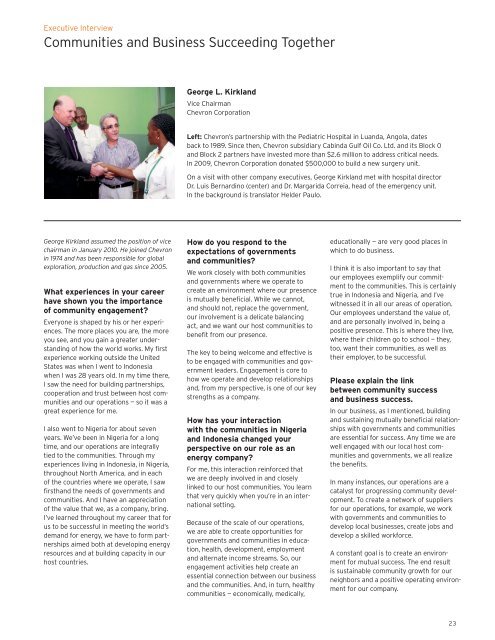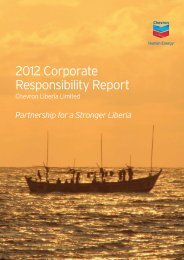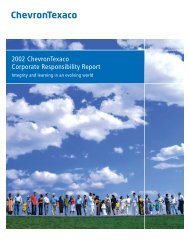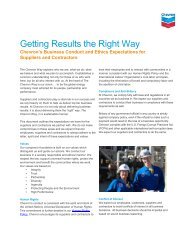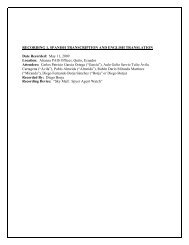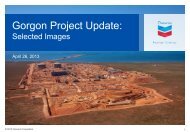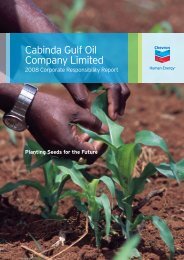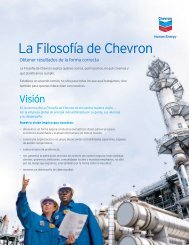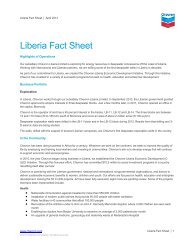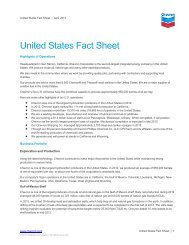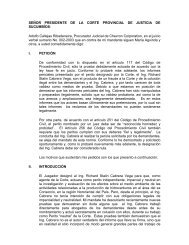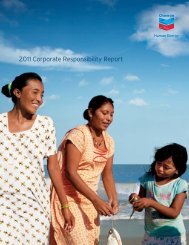Chevron Corporate Responsibility Report 2009
Chevron Corporate Responsibility Report 2009
Chevron Corporate Responsibility Report 2009
You also want an ePaper? Increase the reach of your titles
YUMPU automatically turns print PDFs into web optimized ePapers that Google loves.
Executive Interview<br />
Communities and Business Succeeding Together<br />
George L. Kirkland<br />
Vice Chairman<br />
<strong>Chevron</strong> Corporation<br />
Left: <strong>Chevron</strong>’s partnership with the Pediatric Hospital in Luanda, Angola, dates<br />
back to 1989. Since then, <strong>Chevron</strong> subsidiary Cabinda Gulf Oil Co. Ltd. and its Block 0<br />
and Block 2 partners have invested more than $2.6 million to address critical needs.<br />
In <strong>2009</strong>, <strong>Chevron</strong> Corporation donated $500,000 to build a new surgery unit.<br />
On a visit with other company executives, George Kirkland met with hospital director<br />
Dr. Luis Bernardino (center) and Dr. Margarida Correia, head of the emergency unit.<br />
In the background is translator Helder Paulo.<br />
George Kirkland assumed the position of vice<br />
chairman in January 2010. He joined <strong>Chevron</strong><br />
in 1974 and has been responsible for global<br />
exploration, production and gas since 2005.<br />
What experiences in your career<br />
have shown you the importance<br />
of community engagement<br />
Everyone is shaped by his or her experiences.<br />
The more places you are, the more<br />
you see, and you gain a greater understanding<br />
of how the world works. My first<br />
experience working outside the United<br />
States was when I went to Indonesia<br />
when I was 28 years old. In my time there,<br />
I saw the need for building partnerships,<br />
cooperation and trust between host communities<br />
and our operations — so it was a<br />
great experience for me.<br />
I also went to Nigeria for about seven<br />
years. We’ve been in Nigeria for a long<br />
time, and our operations are integrally<br />
tied to the communities. Through my<br />
experiences living in Indonesia, in Nigeria,<br />
throughout North America, and in each<br />
of the countries where we operate, I saw<br />
firsthand the needs of governments and<br />
communities. And I have an appreciation<br />
of the value that we, as a company, bring.<br />
I’ve learned throughout my career that for<br />
us to be successful in meeting the world’s<br />
demand for energy, we have to form partnerships<br />
aimed both at developing energy<br />
resources and at building capacity in our<br />
host countries.<br />
How do you respond to the<br />
expectations of governments<br />
and communities<br />
We work closely with both communities<br />
and governments where we operate to<br />
create an environment where our presence<br />
is mutually beneficial. While we cannot,<br />
and should not, replace the government,<br />
our involvement is a delicate balancing<br />
act, and we want our host communities to<br />
benefit from our presence.<br />
The key to being welcome and effective is<br />
to be engaged with communities and government<br />
leaders. Engagement is core to<br />
how we operate and develop relationships<br />
and, from my perspective, is one of our key<br />
strengths as a company.<br />
How has your interaction<br />
with the communities in Nigeria<br />
and Indonesia changed your<br />
perspective on our role as an<br />
energy company<br />
For me, this interaction reinforced that<br />
we are deeply involved in and closely<br />
linked to our host communities. You learn<br />
that very quickly when you’re in an international<br />
setting.<br />
Because of the scale of our operations,<br />
we are able to create opportunities for<br />
governments and communities in education,<br />
health, development, employment<br />
and alternate income streams. So, our<br />
engagement activities help create an<br />
essential connection between our business<br />
and the communities. And, in turn, healthy<br />
communities — economically, medically,<br />
educationally — are very good places in<br />
which to do business.<br />
I think it is also important to say that<br />
our employees exemplify our commitment<br />
to the communities. This is certainly<br />
true in Indonesia and Nigeria, and I’ve<br />
witnessed it in all our areas of operation.<br />
Our employees understand the value of,<br />
and are personally involved in, being a<br />
positive presence. This is where they live,<br />
where their children go to school — they,<br />
too, want their communities, as well as<br />
their employer, to be successful.<br />
Please explain the link<br />
between community success<br />
and business success.<br />
In our business, as I mentioned, building<br />
and sustaining mutually beneficial relationships<br />
with governments and communities<br />
are essential for success. Any time we are<br />
well engaged with our local host communities<br />
and governments, we all realize<br />
the benefits.<br />
In many instances, our operations are a<br />
catalyst for progressing community development.<br />
To create a network of suppliers<br />
for our operations, for example, we work<br />
with governments and communities to<br />
develop local businesses, create jobs and<br />
develop a skilled workforce.<br />
A constant goal is to create an environment<br />
for mutual success. The end result<br />
is sustainable community growth for our<br />
neighbors and a positive operating environment<br />
for our company.<br />
23


